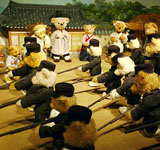| Re-employed elders pose new challenges for gray-haired China | |
http://english.dbw.cn銆€銆€
2010-11-30 10:00:42
|
|
|
When Li Zhihui reached the retirement age of 60, seven years ago, he chose not to withdraw to the leisure existence revolving around family love, the traditional lifestyle for ancient Chinese reaching longevity. Rather, Li returned to his hectic work in a western Chinese hospital, which reemployed him as a "senior specialist" in 2003. The salary was even higher, he said, as patients kept swarming in to seek the clinical wisdom he learned from many years of work. "Patients prefer older, experienced medical practitioners, and as for me, it's better to work here than to rust away at home," said Li. China has seen a rapidly graying society. Its elderly population totaled 167 million by the end of 2009, and one out of eight Chinese are now age 60 and above, a proportion that will shift to 31 percent by 2050. But as more Chinese joined the gray-haired army, it does not naturally follow that they also stopped working. SURGING DEMAND With age comes wisdom, and many Chinese employers have come to see the truth in this old saying. In the job market in Guiyang, capital of south China's Guizhou Province, the demand for skilled and healthy retirees (males above 60 and females above 55 or 50) runs high. Over 70 percent of the retirees in education and medical services get re-employed, while those in architectural engineering, landscaping, and administration are also desired by private companies, said Liu Runsheng, vice chief of the city's job market. "Some companies have even offered job contracts and a fat salary to those who are about to retire," said Liu. Employers believe that seniors' advanced experience and extended social network can bring quick benefits to the operation of a company or institution. Further, by hiring retirees who are already recipients of an old-age pension, employers are exempt from social security payments, thus lowering their labor cost. "Older people are more loyal to the job and demand less in return," said Ai Jing, who runs a youth training program in Guiyang. Ai Jing said his institution had spent much money on training young teachers, but failed to keep those ambitious college grads. The staff that stayed turned out to be the retired teachers they had recruited. "They juggled different tasks with consummate ease and never grouse about overtime work on the weekend," said Ai. Experts have attributed this "glutton for work" virtue to those who cannot stay idle at home because of their fear of losing their value in life after retiring from a lifelong career. Moreover, some re-employed elders, who are covered by the pension plan and medical insurance, choose jobs of interest to them and worry less about the pay. However, the return of the old has raised concerns among the younger generation who have already fought hard in hunting for jobs and now face new rivals who are the age of their grandfathers. "We've been calling for a complete retirement of older people; they must make rooms for the youngsters," said Pan Ping, head of the Guiyang Municipal Committee on Ageing. But Liu Changjiang, a senior reemployed engineer, said the elderly would not usurp the jobs of the young, since the two had different positions to occupy. "We are not in a contest; on the contrary, we learn from each other, as old people have rich experience while youngsters are more versed in new technologies," said Liu. LIFE PRESSURE The reemployment rate of the elderly is anywhere between 13 percent to 18 percent in most Chinese cities, according to Hao Maishou, gerontologist at the Tianjin Academy of Social Science. While some are continuing their career dreams based upon a fat pension, the majority are toiling under the whip of financial pressure, said Hao. Lin Aiguo, 63, said he used to do carpentry and other manual work in Guiyang before his becoming frail forced him into selling newspapers on the street. "I receive no pension, and since no one would like to hire me, I have to be self-employed to earn a living," said Lin. Experts say many urban workers in self and flexible employment are not participating in basic old-age insurance, while low pension payments also leaves some retired workers uneasy about their financial conditions after retirement. Further, the situation will be exacerbated as the parents of the country's first "only child" generation reach old age. "An 'only son or daughter' couple has four aging parents to feed, which will place a huge burden on their finances," said Xia Haiyong, head of the Population Research Institute at Nanjing University. Though traditional Chinese cultures preach about raising a child for providing security in old age, Xia said many aged parents now have gone back to work to lighten the burden on their children. The real problem, however, is that, as some experts point out, China has not prepared itself for this new challenge. Tan Jing, a lawyer at the Guangzhou Human Resource Manager Institute, said the protection of seniors' rights in the job market remained a legal blank. "Retirees are excluded from the current labor laws in China, and they would have problems safeguarding their rights," said Tan. Others have also called for more 'elderly-friendly' services, such as childcare and youth training, to accommodate senior jobseekers. "The elderly participation in the job market will be a trend as society ages, and China needs to adjust its thinking and laws to face up to the challenge," said Hao Maishou. |
|
| Author锛? Yao Yuan, Li Jingya 銆€銆€銆€Source锛? xinhua 銆€銆€銆€ Editor锛? Yang Fan | |
 涓枃绠€浣?/a>銆€|銆€
涓枃绠€浣?/a>銆€|銆€










